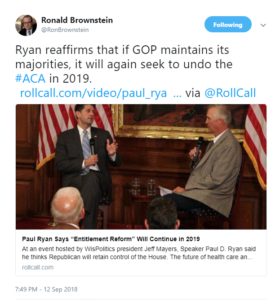
Last night, Paul Ryan became the latest Republican to call for a return to full health repeal:
Paul Ryan: Good reforms mean that we can better fulfill the mission of these important programs, health and retirement security, without bankrupting the country. And that’s why the kind of reforms we’ve been talking about I think are so necessary.
Jeff Mayers: Ok, but that would depend upon – I mean, the Senate didn’t even agree with you. That would depend on having broader control of Congress than you’ve had.
Ryan: We failed to pass our budget, our entitlement reform bill on health care by one vote in the Senate, that’s correct.
Mayers: So I guess what are the prospects of reigning that in, because –
Ryan: I think the election will have to determine that because, based upon our vote count in the Senate. We keep the House majority in the house, which I think we will, and then you have to have enough of a majority in the Senate to be able to pass heath care reform.
Mayers: But do people in Janesville, do people in Wisconsin – is that what they want? Do they really want their benefits taken away or curtailed?
Ryan: Did I say that?
Mayers: No, I know, but do they –
Ryan: I think they want to see an end to double-digit premium increases. I think they want to see that we have Medicare on a path to solvency. I don’t think they want to see 200 million people get added to Medicare to accelerate its bankruptcy, which is what a lot of people are running for, like Tammy and others. I think if you take a look at our proposals, they would have lowered health care premiums, it would have still protected pre-existing conditions, it would’ve done more to give people more choices.
As a reminder, the so-called American Health Care Act would have:
- Raised Premiums By Double Digits. The nonpartisan Congressional Budget Office found that a key part of the American Health Care Act, repealing the requirement that most people have health insurance and was enacted as part of the GOP tax bill, will premiums 10 percent next year.
- Imposed An Age Tax – Older Americans Would Have Paid Nearly $12,000 More. The American Health Care Act would have imposed what the AARP calls an “age tax” on older Americans by cutting the amount of assistance older people receive and by allowing insurers to charge people over 50 fives times more. Nationally, out-of-pocket costs for older people could have increased by as much as $11,917 by 2026.
- Increased Premiums for People With Pre-Existing Conditions by Up to $150,000. The American Health Care Act would have allowed states to eliminate community rating, meaning insurers would be able to charge people with pre-existing conditions more. This surcharge could have been in the tens of thousands of dollars and even six figures: up to $4,270 for asthma, $17,060 for pregnancy, $26,180 for rheumatoid arthritis and $140,510 for metastatic cancer.
- 23 Million Americans Would Have Lost Coverage. By 2026, 23 million U.S. residents would have lost coverage under this bill.

